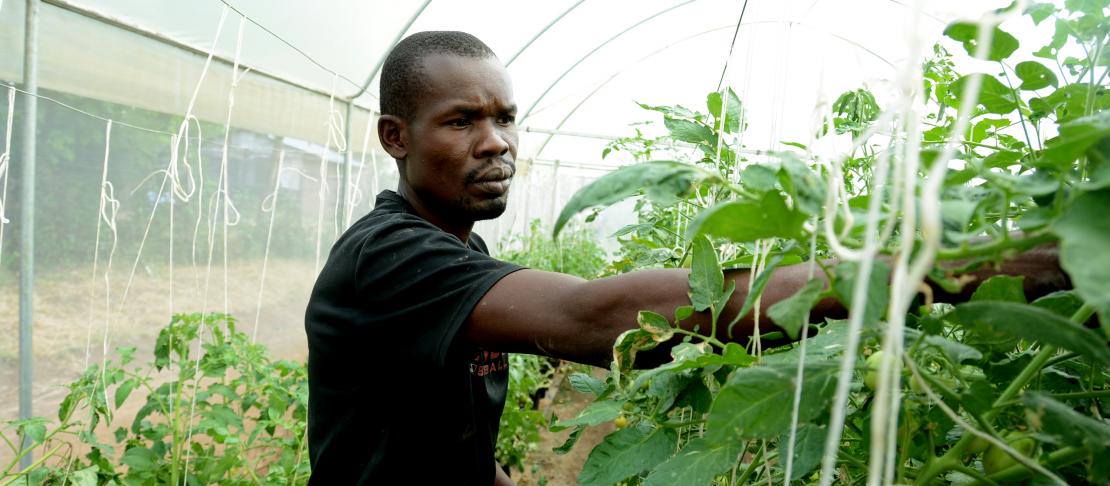Enhancing readiness to address climate shocks in Africa

Five African governments develop climate-smart agriculture country programs guided by a number of experts including CCAFS researchers.
Africa is the continent which is least responsible for the global accumulation of greenhouse gases (GHG). But much of the continent, however, is already suffering from the negative impacts of climate change. Reports by the Intergovernmental Panel on Climate Change (IPCC), have highlighted that climate change may reduce crop yields in most parts of Africa by 10-20 percent. By 2050, not only will climate change define the possible farming systems in Sub-Saharan Africa, international policies and institutional changes will determine the socioeconomic factors affecting it.
Supporting African countries in planning responses and integrating climate resilience into their agricultural development plans will help enhance readiness to address climate related shocks. Subsequently, starting November 2014 a global research alliance supported five countries in Eastern and Southern Africa in preparing country-specific climate-smart agriculture frameworks programs (CSA-FPs). The alliance includes the CGIAR Research Program on Climate Change, Agriculture and Food Security (CCAFS) East Africa program, the Common Market for Eastern and Southern Africa (COMESA), the East African community (EAC), the Southern African Development Community (SADC) and the New Partnership for Africa's Development (NEPAD Climate Change Fund).
The purpose of this partnership was to enable the five countries Kenya, Uganda, Tanzania, Botswana and Namibia to adopt a holistic approach to agricultural sector transformation, aiming for multiple benefits in a changing climate. This process brought together a team of experts including scientists from the International Livestock Research Institute (ILRI), the Center for International Forestry Research (CIFOR) and the World Agroforestry Centre (ICRAF) to provide technical input to the country CSA-FPs. Participants included representatives from relevant government ministries and departments, civil society organizations (CSOs), private sector and academia.
CSA Country Programs
These programs synergize National Agriculture Investment Plans (NAIPs) and agricultural sector programs with their respective National Climate Change Strategies and Action Plans to deliver on multiple benefits: food productivity and incomes; building resilience in the agriculture sector and the adaptive capacity of the farmers; and contributing to reducing or removal of greenhouse gas emissions from the agriculture and land use sector thus contributing to the global public good.
In each of the five countries the CSA-FPs was developed through a consultative four step procedure. Technical working sessions enabled stocktaking of the sector’s programs, strategies and performance from a historical perspective as well as an analysis of options for agricultural sector growth in a changing climate. Thereafter, consultative sessions were carried out with interested groups followed by national stakeholder validation workshops where comments from stakeholders were discussed and incorporated. The final stage entailed identification of resource mobilization opportunities to support implementation of the programs.
Access the draft country CSA-FPs here.
Of the five countries, Kenya and Tanzania have gone further. Kenya integrated adaptation and mitigation components borrowed from its CSA-FP into a policy document—Intended Nationally Determined Contributions—submitted to the United Nations Framework Convention on Climate Change (UNFCCC) in June 2015. Tanzania, on the other hand, is using the plan developed as a foundational document to support a proposal to transform agriculture in the country to the Green Climate Fund (GCF).
Read more: Kenya integrates climate-smart agriculture into its Intended Nationally Determined Contribution
Although CSA-FPs are vital for scaling out CSA and show government commitment towards it, innovative partnerships are equally important.
Partnerships for scaling out CSA
An ongoing project by the World Agroforestry Center (ICRAF) and the International Center for Tropical Agriculture (CIAT) is formalizing new partnerships with key African institutions aimed at supporting the scaling up - and out - of a CSA approach for programs ranging from sub-national to continental levels. Such institutions include: African Union New Partnership for Africa's Development (AU-NEPAD), Alliance for CSA in Africa (ACSAA), Regional Economic Communities, Food and Agriculture Organisation of the United Nations (FAO) and national governments. This initiative helps partners to use science-based approaches for targeting, prioritizing and scaling CSA through an integrated approach from situation analysis through monitoring and evaluation called ‘CSA Plan’. The data, tools, and lessons earned will be built into an open source platform that stands to become the clearinghouse for CSA decision support. The ultimate aim is to increase CSA adoption by farmers and return on CSA investments by donors.
Download poster: 25 million African farming families by 2025: science - development partnerships for scaling climate-smart agriculture (PDF).
The way forward
Transformation to CSA requires a systematic approach, addressing the full scale of the climate challenge and agricultural development. CSA is founded on the principles of integrated landscape management and is driven by the ultimate goal of ensuring resilience as an integrated aspect of inclusive green growth, productivity and sustainability in the face of a changing climate. The new agricultural production systems should not only be more productive and efficient, but also more stable and resilient to short, medium and long-term shocks and risks associated with climate change and climate variability. Such a transformation would entail significant changes in the manner in which soil nutrients, water, land and genetic resources for both crops and livestock are managed and utilized. The CSA Programs are a step in that direction and are aligned with the AU/NEPAD Comprehensive Agriculture Development Programme (CAADP).
Additional reading
Introducing climate-smart agriculture tools for Africa
Kenya integrates CSA into its Intended Nationally Determined Contribution
Tabitha Muchaba is a Research Assistant at the CCAFS East Africa regional program, based at the International Livestock Research Institute (ILRI).
Todd Rosenstock is an Environmental Scientist with the World Agroforestry Centre (ICRAF).
Story editted by Vivian Atakos, Communication Specialist - CCAFS East Africa.



